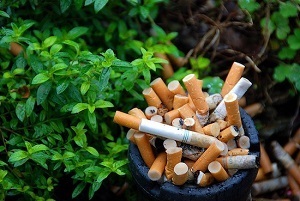
Opening concert of Annual Meeting 2025 in Davos-Klosters to address glacier melt in Antractica
The opening concert of the Annual Meeting 2025 in Davos-Klosters will address the pressing issues ...

The World Health Organization (WHO) announced the 2022 global campaign for World No Tobacco Day – “Tobacco: Threat to our environment.”
The campaign is aimed to raise awareness among the public on the environmental impact of tobacco – from cultivation, production, distribution and waste. It will give tobacco users one extra reason to quit.
The campaign will also aim to expose tobacco industry’s effort to “greenwash” its reputation and products by marketing themselves as environmentally friendly.
With an annual greenhouse gas contribution of 84 megatons carbon dioxide equivalent, the tobacco industry contributes to climate change and reduces climate resilience, wasting resources and damaging ecosystems.
Around 3.5 million hectares of land are destroyed for tobacco growing each year. Growing tobacco contributes to deforestation, especially in the developing world. Deforestation for tobacco plantations promotes soil degradation and “failing yields” or the capacity for the land to support the growth of any other crops or vegetation.
“The environmental impacts of tobacco using adds unnecessary pressure to our planet’s already scarce resources and fragile ecosystems. This is especially dangerous for developing countries, as that’s where most of the tobacco production happens.” said Dr Ruediger Krech, Director of Health Promotion, “Every cigarette you smoke, you are literally burning resources where they are already scarce, burning resources where our very existence depends upon.”
The environmental burden falls on countries least able to cope with it, the profits are made by transnational tobacco companies that are based in higher-income countries.
With about 90% of all tobacco production concentrated in the developing world, tobacco has an immensely uneven impact on different socioeconomic groups. In low- and middle-income countries, many farmers and government officials see tobacco as a cash crop that can generate economic growth, however, the short-term cash benefits of the crop are offset by the long-term consequences of increased food insecurity, frequent sustained farmers’ debt, illness and poverty among farm workers, and widespread environmental damage in low- and middle-income countries.
The tobacco industry has also invested heavily to “greenwash” their environmentally damaging practices by reporting environmental impact and funding environmental corporate social responsibility projects and organizations. Their smoke screen is only able to work due to lack of objective data as well as limited and inconsistent legislation at international and local levels.
Reducing tobacco consumption needs to be identified as a key lever for achieving all of the Sustainable Development Goals, not just those directly related to health.
The campaign calls on governments and policy makers to step up legislation, including implementing and strengthening existing schemes to make producers responsible for the environmental and economic costs of tobacco product waste.
The opening concert of the Annual Meeting 2025 in Davos-Klosters will address the pressing issues ...
Juhayna Food Industries proudly announced that its agricultural arm, El Enmaa for Agricultural Development, has ...
The United Nations Environment Program (UNEP) and several partners launched a pilot project to build ...


اترك تعليقا